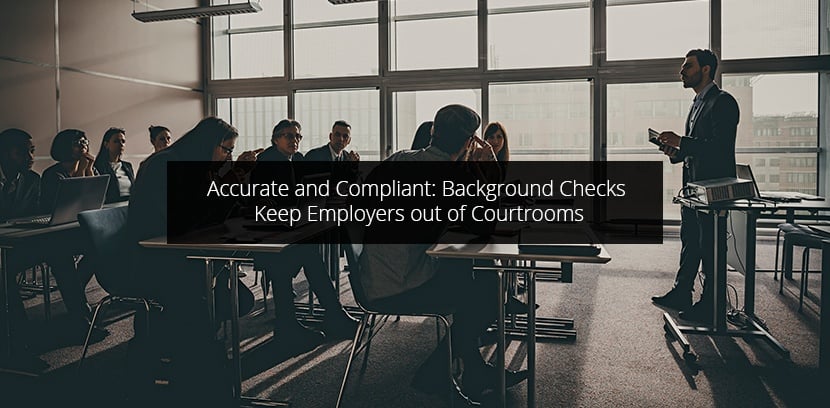An Employer's Guide to FCRA Hiring Compliance in 2021 & 2022

With daily news articles of enterprise businesses facing FCRA class-action lawsuits, we understand the importance of compliance when hiring. That's one of the reasons our blog includes numerous educational articles for employers who wish to honor federal and state regulations. We've consolidated many of those helpful articles so you can bookmark this page for guidance.
An Employer's Guide to FCRA Hiring Compliance in 2021 & 2022.
Understanding FCRA Compliance
The Fair Credit Reporting Act was passed in 1970 to ensure the data collected on consumers was truthful and accurate. If employers, creditors, and banks were using the data to deny employment, loans, or housing, then it must be reliable data.
With background checks, applicants provide personal information such as their address, phone number, social security number, and more. In effect, they're trusting you, as the employer, that their private data will be protected and secure. The FCRA offers insurance that their data is safe and factual.
Obtaining Authorization Prior to Screening
Employers must obtain applicant consent prior to obtaining a background check. The FCRA offers the following protections:
- Consent is required to obtain the consumer's background report.
- Before the "furnisher" or consumer reporting agency (CRA) can provide the report, the requesting party must have a "permissible purpose" such as:
- for employment
- for credit
- for insurance
- The consumer must be told if the information will be used against them.
- The consumer has the right to know what's on their report.
- The consumer has the right to dispute inaccurate or outdated information on their report.
The applicant consent form must be a standalone, "clear and conspicuous" document, separate from the job application, and the applicant must provide their authorization in writing. The form must also provide FCRA-required language only.
Learn more about applicant consent:
Choosing a Screening Partner
VeriFirst's FCRA-certified staff is proud to have passed the rigorous standards of compliance and consistency to become accredited by the Professional Background Screeners Association. As a PBSA-accredited company, our customer service works with your company to ensure transparency and guidance when tackling FCRA compliance, consumer protection and general background screening best practices. When your hiring managers are screening candidates, a PBSA-accredited background check company will help minimize risk and remain compliant with FCRA regulations.
Denying Employment
After receiving the report, the background check results must then be reviewed to determine if the applicant meets your requirements. The applicant must also have the opportunity to view the results and be provided with "A Summary of Your Rights Under the Fair Credit Reporting Act."
When taking adverse actions, such as terminating or denying employment, the applicant must be notified via a pre-adverse action notice. Along with the report and FCRA rights document, the notice must contain the following:
- A written summary of the background check report results.
- Name, address, and phone number of the screening company that supplied the background report.
- A brief statement showing that the screening company did not make the adverse action decision and that they are unable to give the applicant any information on the decision.
- A statement that informs the applicant that can dispute the information in the report or receive a free copy of the report from the screening company as long as it is requested within 60 days.
If the applicant does not dispute the findings or doesn't respond in a reasonable amount of time (~ 5 days), then the employer can follow up with an adverse action notice.
Learn more about denying employment:
- How to Judge Background Check Contents for Fairness and Compliance
- Assessing Criminal Records in Employment Decisions
- Timing of Adverse Action Notices
- Denying Employment in the Era of COVID-19
Other FCRA Compliance Concerns
Since applicants are trusting you with their personal data, it is also important to keep that data secure or to destroy it when necessary. See also: Records Retention for HR
Some states have passed their own FCRA laws. Employers must follow those recommendations as well to stay compliant. See also: The Difference Between State and Federal FCRA Laws
The best way to avoid non-compliance is to understand why some employers have faced lawsuits. Learn more: Common HR Violations of the FCRA
As always, let us know if you have any questions. We'd love to be your screening provider. Click on the link below for a free quote.
Share this
You May Also Like
These Related Stories

Accurate and Compliant: Background Checks Keep Employers out of Courtrooms

Choosing the Best Employment Background Check Services



